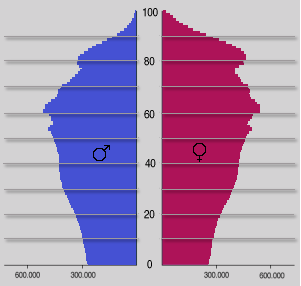One of the biggest challenges currently facing many European countries as well as some other MEDCs (e.g. Japan), seems to be the contraction of its population – i.e., exactly the opposite of what is the problem globally. When you ask a politician or an economist, or a demographer, you will be told that this challenge is a really daunting one – it calls into question one of the foundations of European wealth, the welfare state.
It is well-known that the “optimal” demographic structure of the society is a stable one, visualized by the stationary population pyramid. Meanwhile, in many European countries the tendency is toward a contracting pyramid-structure, as seen in the example below (it shows the projected demographic structure of the German population in 2050):

CC-licence: Breßler from de.wikipedia.org
All these are short- to middle-term consequences. They are difficult to handle and present a great challenge for European societies. Nevertheless, a shrinking overall population is not necessarily a bad thing – especially when the long run and global aspects are considered.
It is rather improbable that European populations contract until they vanish. Sooner or later they are going to stabilize – though at a much lower level than the approximately 750 million people inhabiting the continent today. When that happens, we should be glad – a smaller population means less pressures on ecosystems and the Earth’s resources, more space for everyone, less congestion etc. Since one of humanity’s greatest worries is that of overpopulation, it cannot be entirely bad if there is going to be significantly fewer people somewhere. Of course, Europe’s demographic contraction alone is not enough to solve the global population problem. But is can and should be seen as a contribution.
The fact is that, as was emphasized by ecological economists since the 60′s, humanity’s environmental impact = per capita resource use * population, with a broad definition of resources. Trivial as this equation appears, it contains a very important message – the fewer people living on Earth (assuming a constant per capita impact), the lower their impact on the global environment, especially when these people have a high per capita resource use (as Europeans do). So, if there were meaningfully less people in Europe, their pressure on resources in Europe as well as elsewhere (due to imports) would become lighter – even though Europeans are only slightly more than 10% of the world population. The long run considered, we can only welcome such a development.
So, is Europe’s population problem really one? Yes, it is. The transition period during which the population contracts has already begun, and it will not be easy to handle it. The European welfare state model may well need a deep reform. And it may well be that this transition period will be painful. But, on the other hand, there is a positive side to this demographic challenge. It can contribute to a process of lessening humanity’s pressure on the Earth’s resources – the resources our livelihoods are fully dependent on and which we have ever less of. Indeed, it is possible that, in the long run, we (or, more aptly, our descendants) will be better off because of what we are now considering a great problem.
from: http://zielonygrzyb.wordpress.com/2011/09/08/is-europes-population-problem-really-one/